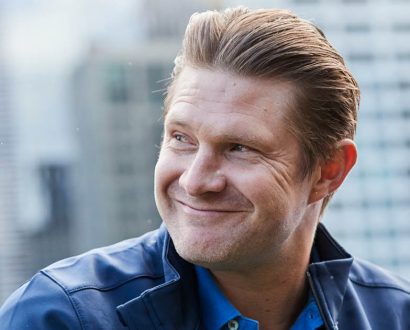From tragedy to career change: A new innings for Shane Watson

Australian cricketing legend Shane Watson was fielding at first slip when his South Australia teammate and close friend Phillip Hughes was struck on the side of his neck by a bouncer during a Sheffield Shield match in Sydney in 2014. Hughes, a 25-year-old international test match star, never regained consciousness and died two days later in hospital.
The freak accident sent shock waves around the sporting world and, for Watson, represented an unimaginable personal tragedy. How could the game he had devoted his life to claim the life of a young batsman who was wearing a protective helmet?
From that moment on, it was a question that would swirl around his mind every time he stood at the crease preparing to face a 150-kilometer-per-hour delivery from a fast bowler. And working out the answer led the record-breaking all-rounder on a surprising journey into a new career as a high-performance mindset coach and author.

Today, the veteran of 59 test matches and nearly 200 one-day internationals helps businesses and athletes face up to their own equivalents of the pace bowler by teaching them how to clear their minds of distractions in high-pressure environments and focus only on the task at hand.
"When the ball’s flying towards me, it has to be the only thing I’m thinking about," he tells The CEO Magazine. "But it’s all too easy for the mind to wander and for doubts to creep in. Being able to concentrate your thoughts is a skill that has to be learned."
Overriding fear
Watson played for his country during a golden age of Australian cricket that saw him win two Cricket World Cups and be named player of the match in two victorious ICC Champions Trophy finals. He spent a record 120 consecutive weeks as the world’s number one Twenty20 (T20) all-rounder.

Steve Smith and Shane Watson of Australia celebrate after hitting the winning runs during the 2015 ICC Cricket World Cup final match between Australia and New Zealand at the Melbourne Cricket Ground
But that terrible day in 2014 very nearly brought his glittering career to a premature end.
"As soon as I stepped up to bat for the following match, I knew something was very different," he remembers. "I’d never had any fear before, but suddenly every time the ball was pitched short and bounced up towards me, my head was filled with all these negative thoughts and I didn’t know how to override them.
"Over time it got worse and worse and my form fell apart. I was dropped from the test team and just thought, ‘I can’t do this anymore.’ I was very close to retiring."
"I’d never had any fear before, but suddenly my head was filled with all these negative thoughts, and I didn’t know how to override them."
But then a chance meeting with Australian IndyCar champion Will Power changed his life forever.
"I was at this awards night, the only time I ever went – and was sat next to Will. We got chatting and I told him I’d always thought being a racing driver was the coolest job on the planet.
"He agreed it was cool but told me that when he’d seen one of his friends killed in a crash, he’d struggled to get back behind the wheel. He really opened up about it and I realized I’d been going through the same thing."
Power told Watson that he’d turned to Canadian high-performance mindset coach Jacques Dallaire, who had helped business leaders, sports teams, entertainers and hundreds of racing drivers achieve their maximum potential by overhauling their thinking.
It had to be worth a shot.
Teaching high-performance
"As soon as I spoke to Jacques, I knew he understood exactly what I’d been going through," Watson says. "He told me how we often sabotage our own performance if we don’t know how to take control of our thoughts and emotions. Most sportspeople only develop a healthy mindset through trial and error because no-one has taught them how to do it."
After just a few sessions of ‘performance thinking’ with Dallaire, Watson was, ahem, bowled over with the results.
Shane Watson with his son, Will, in the change rooms after day five of the Fourth Test match between Australia and India at the Sydney Cricket Ground in 2015
"As soon as he taught me how to create a positive mental environment and understand why I’d become scared to face fast bowlers, it had an immediate impact," he says. "From then on, if I had a negative thought, I knew how to deal with it so I could remain present and fully engaged."
"When the ball is flying towards me, it has to be the only thing that I’m thinking about."
His form soared to such an extent that he won his place back in the T20 World Cup squad and then scored his only T20 century against India at the Sydney Cricket Ground.
"I was captain and batted 20 overs and bowled four," Watson recalls. "Usually, I’d have been mentally fried after all that, but I could happily have played the match all over again!"
Transforming lives
When Watson finally upped stumps on his playing career four years later to become a cricket coach and media commentator, he was determined to use what he had learned to help others.
Together with his wife, Lee Furlong, he launched Beon Performance, a mindset coaching business based on the science-based principles and techniques that had transformed both his personal life and his sporting career.
"Dr Dallaire’s therapies didn’t only improve my batting, they made me a better parent, a better partner and a better friend," he says. "As a dad, I’d always been results-focused, so if my son or daughter did well at something, I’d be full of praise. But if they failed, the mood would be somber and it’d all be about what they’d done wrong.
"But now, I feel the same emotion if they win or lose, as it’s all about whether they did the best they could and how we can work together to get better results. Neither of them feels I love them any more or less if they win or lose, so there’s less pressure on their performance."
Shane Watson’s book, ‘The Winner’s Mindset’, was published last year
Last year, Watson’s book, The Winner’s Mindset, was published, sharing the methodologies and mental health frameworks that underpin his philosophies. It also includes life lessons from cricketing greats including Ricky Ponting, Viv Richards, Kevin Pietersen, Allan Border and Justin Langer.
"Dr Dallaire’s therapies didn’t only improve my batting, they made me a better parent, a better partner and a better friend."
In the introduction, Watson writes, "One of the oldest sayings in cricket is ‘most of the time you get yourself out’; a lot of the time in cricket, it is now very obvious to me, that we’re in a battle with ourselves.
"I had spent 20 years around sports psychologists and mental skills coaches, but either I had not been in the right frame of mind or what they told me had not resonated. What Jacques said was so practical and so memorable I felt like I had seen past the ‘what’ and the ‘how’ to the ‘why’ of sport."
New online course
The book has also been adapted into an interactive online course, The Winner’s Mindset: When Performance Matters, by global technology company SafetyCulture, whose mobile-first tools are used by more than 85,000 organizations in 185 countries.
"Developing the course has been one of the most fulfilling things I’ve ever done," Watson says of the online course, which is available on his website. "I’ve been blown away by how skillfully SafetyCulture has integrated all the elements of my book into a platform that’s a really engaging mix of videos, audio segments, quizzes and reading material. People can do it on any device and at their own pace."
"Developing the course has been one of the most fulfilling things I’ve ever done."
There’s no hiding the excitement in the 43-year-old’s voice as he talks about his unexpected new mission.
"I love seeing how much we can improve people’s lives by unlocking their potential and showing them how to take back control of their destiny," he says proudly.
"Learning how to get into a high-performance mindset changed my entire life and I want to spread the word as widely as I can so it can bring joy and fulfillment to others."